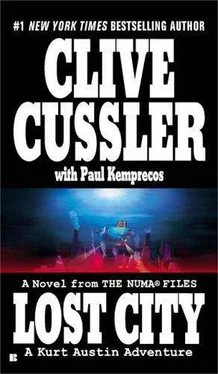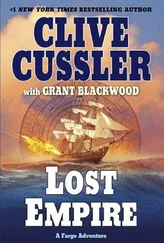The passageway ended in another stone door, which was also rolled aside. Racine stepped through the opening and waved her torch in the air so that the flame crackled and snapped. The dancing torchlight illuminated a stone slab about two feet wide that seemed to jut out into empty space from the edge of a precipice.
"I call this the "Bridge of Sighs," " Racine said, her voice echoing and reechoing off the deep walls of the chasm. "It's much older than the one in Venice. Listen." The wind wailed up from below like a chorus of lost souls and tousled her long flaxen hair. "It's best not to pause."
She dashed across the slab with seemingly reckless abandon. Skye hesitated. Austin took her hand and, together, they shuffled across the narrow bridge toward Racine's fluttering torch. The wind tugged at their clothes. The distance was about thirty feet, but it might as well have been thirty miles.
Zavala was a natural athlete, who had boxed in college, and he strode across with the surefootedness of a high-wire walker. The guards, and even Marcel, took their time as they made their way across and it was obvious they didn't like this part of their duty.
The guards unlocked a thick wooden door and the procession stepped out of the catacombs into an open space. The air was dry and heavily scented with a strong piney smell. They were in an aisle
around a dozen feet across. Racine walked over to a low wall between two massive square columns and beckoned for the others to follow.
The walkway was actually the top tier of an amphitheater. Three more tiers of seats lit by a ring of torchlight descended to an arena. The seats were occupied by hundreds of silent spectators.
Austin gazed through an arch at the vast open space. "You never cease to surprise, Madame Fauchard."
"Few strangers have ever seen the sanctum sancto rum of the Fauchards."
Skye's fears had been momentarily overshadowed by her scientific curiosity. "This is an exact replica of the Coliseum," she said with an analytical eye. "The orders of columns, the arcade, everything is the same except for the scale."
"That should come as no surprise," Racine said. "It's a smaller version of the Coliseum, built by a homesick Roman proconsul for Gaul who missed the amusements of home. When my ancestors were searching for a site to build the chateau, they thought that by having the great house rest on a place where gladiators shed their blood they could fuse with the martial spirit. My family made a few modifications, such as adding an ingenious ventilation system to bring air to this place, but otherwise all is as they found it."
Austin was puzzled by the spectators. There should have been a murmuring of voices, a rustling or coughing. But the silence was palpable.
"Who are all these people?" he asked Racine.
"Let me introduce you," she replied.
They descended the first of several crumbling interior staircases. At ground level, a guard unbolted an iron gate and the group passed through a short tunnel. Racine explained that it was the access for the gladiators and other entertainment. The tunnel led to a circular arena. Fine white sand covered the floor.
A carved marble dais about five feet high stood at the center of the arena. Steps had been cut into the side of the rectangular platform. Austin was studying the stolid faces of a contingent of guards who stood at attention around the arena's perimeter when he heard a gasp from Skye, who hadn't let go of his hand since crossing the chasm. She squeezed his fingers in a viselike grip.
He followed her gaze to the lowest row of seats. The yellow torchlight fell upon skeletal grins and parchment yellow skin and he realized he was staring at an audience of mummies. The dried bodies filled row after row, tier after tier, staring down at the arena with long-dead eyes.
"It's all right," he said evenly. "They won't hurt you." Zavala was awestruck. "This is nothing but a big tomb," he said. "I'll admit I've played to livelier audiences," Austin said. He turned to Madame Fauchard. "Joe's right. Your sanctum sancto rum is a glorified mausoleum."
"To the contrary," Racine replied. "You're standing on the family's most sacred ground. It was there on that podium that I challenged Jules in 1914. And here is where he stood and told us that he would abide by the wishes of the family council. Had not Emil failed, I would have placed my brother's body with the others so he could see my triumph."
Austin tried to imagine Racine's brother making his case for mankind to deaf ears.
"It must have taken a great deal of courage for Jules to defy your murderous family," Austin said.
Racine ignored his comment. She pirouetted on her heel like a ballerina, seemingly at home in this dread place of death, and pointed out several family members who had rejected Jules's appeal so long ago. "Pardon me if I don't get misty-eyed," Austin said. "From the look on their faces, they still haven't gotten over your brother's defection."
"He was not just defying us; he was going against five thousand years of family history. When we returned to France with the Crusaders, we moved our ancestors here to be with us. It took years, with long caravans of the dead winding their way thousands of miles from the Middle East, until, at last, the mummies were brought to this place of rest."
"Why go through so much trouble for a bunch of skin and bones?"
"Our family has always dreamed of eternal life. Like the Egyptians, they believed that if the body were preserved, life would go on after death. Mummification was a crude attempt at cryogenics. The early embalmers used pine resin rather than liquid oxygen as they do now." She looked past Austin's shoulder. "I see our guests have begun to arrive. We can begin the ceremony."
Ghostly figures dressed in white robes were filing into the arena. The group was equally divided between men and women. There were about two dozen people, and their white hair and wrinkled faces seemed only decades removed from the silent mummies. As the figures came into the arena, they kissed Madame Fauchard's hand and gathered in a circle around the dais.
"You already know these people," Racine said to Austin. "You met them at my party. They are the descendants of the old arms families."
"They looked better in costume," Austin said.
"The ravages of time are kind to no one, but they will be the elite who will rule the world with me. Marcel will be in charge of our private army."
Austin let out a deep laugh. Startled faces turned in his direction.
"So this is what this insanity is all about? World domination?"
Racine stared at Austin like an angry Medusa. "You find this humorous?" she said.
"You're not the first megalomaniac to talk about taking over the world," Austin said. "Hitler and Genghis Khan were way ahead of
you. The only thing they accomplished was to shed a lot of blood, nothing more."
Racine regained her composure. "But think of how the world would be today if they had been immortal."
"It's not a world most people would care to live in."
"You're wrong. Dostoyevsky was right when he said mankind will always strive to find someone new to worship. We will be welcomed as saviors once the world's oceans have been turned into fetid swamps.
Surely someone from NUMA must know about the undersea plague that is spreading through your oceanic realm like a green cancer." "Gorgonweed?"
"Is that what you call it? A colorful name, and most apt." "The epidemic is not general knowledge. How did you hear about it?"
"You pathetic man! I created it. Long life alone would not give me the power I desired. My scientists discovered the mutant weed as a by-product of their work. When they brought their findings to me,
I knew it was the perfect vehicle for my plan. I turned the Lost City into a breeding ground for this noxious weed."
Читать дальше












